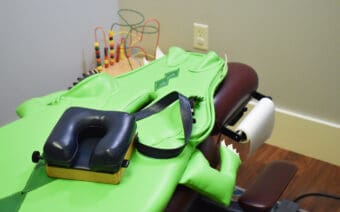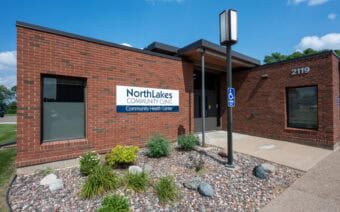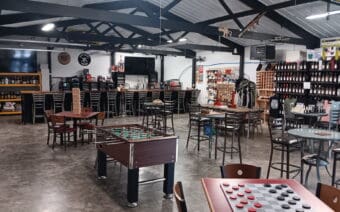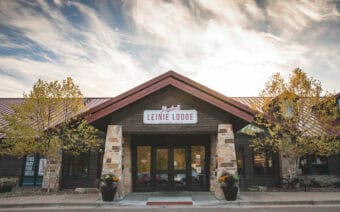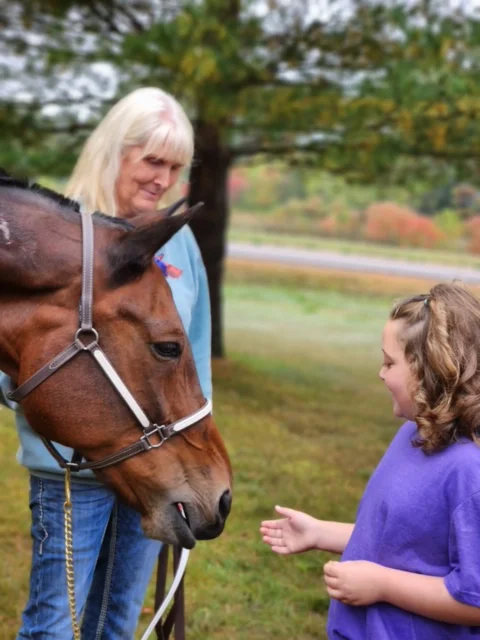
March 18, 2024
MENOMONIE – Standardbred horses have excited crowds with fast-paced harness racing for nearly two centuries.
Now, thanks to Patty Strand, the breed is being utilized not only for people’s thrills but also for therapy.
“One thing about a standardbred – they are versatile,” she said. “Their demeanor is unreal.”
As owner and founder of Hoof Beat Therapeutic Healing Center in Menomonie, Strand said she hopes to share the unique calmness exuded by standardbreds – of which she said she owns 10 – with people of all ages, to help treat a host of mental and emotional benefits.
“I want to help people,” she said. “I know there’s a need (for therapy), and I want to share my animals.”
At Hoof Beat, Strand said, visitors and clients book 45- or 60-minute sessions, guided by Strand.
She said sessions cater to people’s preferred comfort levels, whether that’s riding on her standardbreds, being pulled in a two-seat jog cart on Strand’s private track, grooming and petting the horses, learning how to care for them or simply observing the horses as Strand trains and maintains them.
“I can see what the horse can do for the human and what the human can do for the horse,” she said. “It’s a ‘vice versa’ therapy.”
Reining in the dream
Long before Strand endeavored to offer equine therapy, she said she simply longed for her own horse.
“When I was a kid, that was my dream,” she said. “I begged and begged my parents. (I’d say), ‘it can sleep in the basement!’”
Strand said she grew up enamored and involved with standardbreds and harness racing, in which she said her grandfather competed.
Harness racing, she said, has long been a staple event at county fairs and pari-mutuel tracks, with the horses pulling drivers on carts around a mile-long track at speeds of up to 40 miles per hour.
“To me, it’s more exciting than thoroughbred racing,” she said. “With harness racing, you’ve got a lot of things going on there. There’s so much excitement and maneuvering. You’ve got to know when to pull that horse out to (pass), you’ve got the cart to worry about, you’ve got the other (racers) coming up behind you with a cart and a horse and the horses can be right on your head and banging into you… There’s no protection there or anything.”
Though Strand said she never had her own horse as a child, nor realized her young dreams of personally harness racing, her passion for the sport and the standardbred breed persisted.
Eventually, Strand said, she was able to buy her own standardbred, and ever since, she has owned at least one, and at most 17 – many of which she said are retired from harness racing.
The United States Trotting Association, she said, mandates standardbreds are retired from racing at the age of 14.
“I love them – they’re my kids,” she said. “I still own the first racehorse I ever bought. She’s still here, and she’s 35 years old.”
Strand said the horses live comfortably in her barn at her home property, where she also has a private track.
To continue perpetuating and promoting the sport, Strand said, she served on the board of directors for the Wisconsin Harness Horse Association for 20 years and has served as race director and superintendent of speed for the Barron County Fair’s harness horse races for nearly 12 years.
With the races limited to select, seasonal events, Strand said friends began suggesting she explore other ways to make the most of her stable of standardbreds.
Still, it was only when her mother – who had dementia – came to live with her that Strand said she recognized the therapeutic potential of her horses.
“My mom lived with me for eight years,” she said. “We could see things were changing, and we didn’t want her living by herself anymore. I learned a lot (about dementia) with her living with me. The first stage is frustration, where she can’t remember – that kind of thing. She knew her home wasn’t here, and she kept wanting to go home.”
Strand said she was able to assuage this frustration by having her mother spend time with the standardbreds.
“I’d say, ‘Mom, I’ve got to go down and do chores,’ and she’d say, ‘okay, I’ll come down and help you,’” she said. “So, I’d have her get her boots on and everything and she’d come down and do chores with me every day. It got to where she knew we had to do chores, so she stopped saying she wanted to go home. I saw what being around the horses did for her.”
Strand said that sense of purpose and activity were rewarding and engaging for her mother, drastically improving her mood and mental state.
“Later, when the disease progressed, she still came to the barn with me every day,” she said. “I had a swing down there, and she’d sit and swing and watch me jog and train the horses. She’d get up, go into the barn, look at the horses, come back and sit in the swing and she was so happy.”
Strand said her mother would accompany her to county fairs as well.
“There’d be times where I’d have to get her up at 3:30 in the morning because we were going racing somewhere, and she was happy to go,” she said. “Everyone would say, ‘I love your mom – she’s so happy.’ She loved being around the animals.”
Horse power
Strand said her belief in the effectiveness of equine therapy was further bolstered by a visit from an extended family member.
“He has cerebral palsy, and the first time he came out here he was six and got his very first horse ride,” she said. “He cannot walk – he’s totally paralyzed, and I saw what (being able to ride a horse) did for him. He was just ecstatic – he didn’t want to get off the horse.”
Such events, Strand said, began to stir up further possibilities for her private stable and track over the last few years.
“I started to think more about it, and then last year I just decided, ‘if I’m going to try, I’m going to do it right now,’” she said.
With the support of a three-member board of directors, Hoof Beat Therapeutic Healing Center officially opened on July 23, 2023, followed by a ribbon cutting ceremony hosted by the Menomonie Area Chamber & Visitor Center last fall.
Strand said she has participated in events and parades to promote Hoof Beat – and will be at the upcoming Dunn County Veterans Outreach Conference on April 27.
By design, Strand said, Hoof Beat will be more of a close-knit operation.
“I know there are other places around that are therapeutic, and I’m not trying to compete with them – they do an awesome job,” she said. “Mine’s going to be more of a home environment, and it’s going to be smaller. I’m not trying to have a 50- or 75(-person) group session here. I want to keep it more one on one and personal, or (host) small groups.”
Strand said she has already gotten favorable feedback from community members, including veterans, on how the lack of crowds is preferable when working through trauma.
One early success story, she said, has been the progress one young visitor has made in overcoming her eating disorder.
Strand said this client has made repeated visits and credits the bond she developed with a particular standardbred to help her to heal, reconnect and feel “respite from the chaos.”
“I know how animals can take that bond in if they know something is wrong,” she said. “If I’m having a bad day, they just know it. Horses have such an instinct to them. That’s why therapeutic riding has gotten even bigger, whether it’s with veterans, children, children on the autism spectrum, children that are just having social issues or mental issues – anybody.”
Strand said sessions at Hoof Beat cost $60, however, she said there is no cost for what she considers an initial consultation.
“The first visit, we would need to evaluate what their needs are, and what I can do for them,” she said. “I want them to come out and see what it’s like.”
Strand said she’s aware not everyone is going to naturally, and immediately be at ease by the horses if they’re not previously accustomed.
“If they’re totally petrified, it might not be the place for them,” she said. “But anybody who’s ever come here, they fall in love – even if they’re not a horse lover, they fall in love being around my animals.”
Strand said her “little barn cats” are popular, too.
Since opening Hoof Beat, Strand said she’s learned numerous animal therapy centers had to close amid the COVID-19 pandemic, creating a greater need for treatment – she said she hopes she can help address the gap.
She said she also hopes to educate people about the standardbred breed so dear to her, as well as raise enthusiasm for what she said has been a dwindling interest in harness racing.
Since she already owns the horses and the property, she said the only new cost she incurred in launching Hoof Beat is the additional insurance coverage to protect visitors.
“I’m just trying to cover my expenses and to help the people,” she said. “I’m not here to make a million dollars or anything like that. If it helps to pay some of the costs for the horses, too, that’d be great, because it’s always been paid by me, whether it’s feed or hay.”
Weather permitting, Strand said, she is already accepting appointments for the year.
She said the best way to book a visit is to email her at HoofBeatHealingCenter@yahoo.com.
Above all, Strand said she looks forward to sharing the positive benefits of spending time with standardbreds.
“It’s my love. I just know what it’s done for me, and what it’s done for other people,” she said.
Find more information at HoofBeatTherapeuticHealingCenter.com.
 Beyond the brittle: Uncle Tom’s celebrates 50 years
Beyond the brittle: Uncle Tom’s celebrates 50 years Company relocation to Green Bay is ‘already paying dividends’
Company relocation to Green Bay is ‘already paying dividends’



